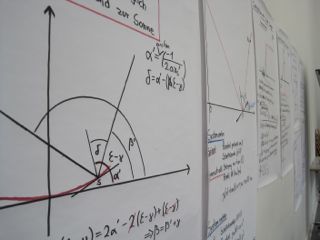What is CAMMP?
CAMMP stands for Computational and Mathematical Modeling Program. It is an extracurricular offer of the Karlsuhe Institute of Technology (KIT) for students of different ages. We want to make the public aware of the social importance of mathematics and simulation sciences. For this purpose, students actively engage in problem solving with the help of mathematical modeling and computer use in various event formats together with teachers. In doing so, they explore real problems from everyday life, industry or research.
CAMMP is a project that was developed and tested for several years at the RWTH Aachen (Schülerlabor CAMMP). Since January 2018, it was also introduced at KIT and funded by the Simulierte Welten project.
Idea
With us, students slip into the role of scientists and thus experience the basics of mathematical modeling by means of practical examples. In small teams they solve challenging real-world problems using mathematical methods and computer simulations. During the process they are supported by scientists.
|
Possible questions that the students may be dealing with come from different areas, such as finance, aerospace, video game design, medical imaging and ecology. Mathematical tools such as numerical and mathematical modeling can be used to solve such complex real-world problems. We enable mathematics and computer science enthusiastic students to go beyond theory and engage in problem solving. Through this longer and more intensive examination of a problem, students gain an insight into the professional world of mathematicians, computer scientists and engineers. |
Source: CAMMP |
In our Podcast you can learn more about the idea behind CAMMP!
We have various offers that are aimed at different target groups:
- Offers for school students
- Offers for university students
- Teacher training courses
Programme objectives
We want to make people aware of the importance of mathematics and simulation sciences for the whole of society. For this reason, our services include career and study orientation. With CAMMP, we link, among other things, the subjects mathematics, computer science and physics, which is why it serves as a perfect link to the subject IMP (computer science, mathematics, physics):
Physics provides the underlying laws of nature, mathematics provides the iterative procedure, and in computer science, simulation is realized on this basis. (Renate Allgöwer ![]() , Stuttgarter Zeitung, 14.08.2018)
, Stuttgarter Zeitung, 14.08.2018)
|
Source: CAMMP |
We teach the use of mathematical modeling in a playful way and thus also promote skills in this area. Mathematical modeling includes the following steps in accordance with the school curriculum:
|
By working in small teams, the students also expand further process-related skills, such as communication and teamwork skills and the use of hardware and software tools for problem solving.
In addition to the students, mathematics teachers can also benefit from an intensive occupation with mathematical modeling. Students often find it very motivating to experience authentic mathematics using real examples.
History
Since 1993, the KOMMS project from Kaiserslautern, similar to CAMMP, has been offering a week on the topic of mathematical modeling in Rhineland-Palatinate every summer. The project week was initiated by Professor Dr. Helmut Neunzert, former director of the Fraunhofer Institute for Industrial Mathematics ITWM. Since then, events of this kind have been held regularly throughout Germany, Austria and Italy (South Tyrol).
In 2011 Prof. Dr. Ahmed Ismail, Dr. Nicole Faber and Prof. Dr. Martin Frank founded CAMMP in Aachen and in May 2011 the first CAMMP week took place, which has been organized annually since then. The event format CAMMP day, one-day modeling days, where classes or courses can learn more about mathematical modeling in one day at RWTH Aachen University, was introduced in 2012. One year later, CAMMP was officially recognized as a student laboratory and has been part of the EDULABS of RWTH Aachen University ever since.
In September 2015 the co-founder Prof. Dr. Ahmed E. Ismail left the student lab, as he followed a call to the University of Virginia. In 2017, CAMMP expanded with a second location in Karlsruhe, since co-founder Prof. Dr. Martin Frank moved to KIT in September 2017 and is building CAMMP there together with Maren Hattebuhr and Kirsten Wohak. Since 2019 we have also been offering events for students in Karlsruhe.



